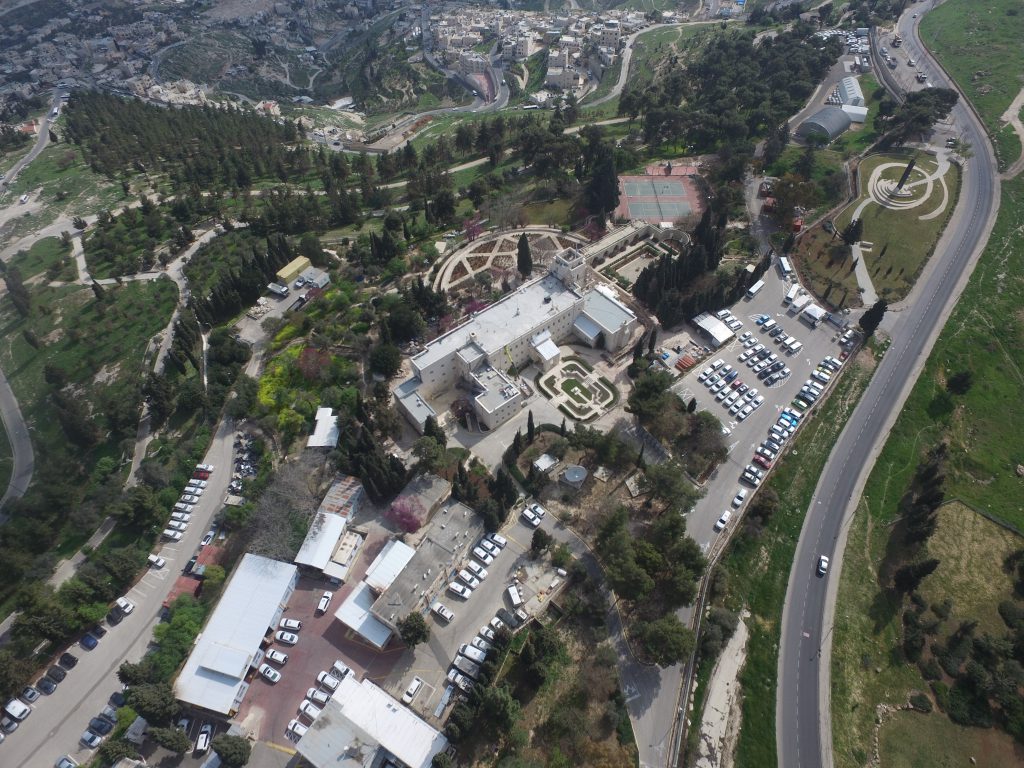
Regavim’s petition regarding the UNTSO Compound in Armon HaNatziv continues.
In March 2017, Regavim petitioned the Jerusalem Magistrates Court for a temporary injunction requiring the Israeli authorities to issue evacuation and restoration orders against illegal construction at the UNTSO compound in Armon HaNatziv, in southern Jerusalem.
This petition was the result of Regavim’s discovery that the UN was carrying out blatant violations of Israeli law and sovereignty at the site, including seizure and unauthorized use of property adjacent to the compound originally “rented” to the UN by the State of Israel, and construction of a number of buildings – including an illegal gas station – at and around the original site for which permits were never requested or received. The work that had either been completed or that was then underway had already caused significant changes to protected historic structures, and posed a possible environmental threat, aside from the basic violation of Israeli law and Israeli sovereignty in Jerusalem.
In the hearing of Regavim’s petition on 8 November 2017, the State’s representatives confirmed that these construction projects had, in fact, been carried out and were still in progress, but stated that the Israeli government would be carrying out diplomatic discussions with representatives of the UN on this matter.
Over the course of the next three years, these “diplomatic discussions” continued, and last week (15 September 2020) the State’s representatives notified the court that this process had reached a successful conclusion: The sides agreed that all future construction work at the site will be “consonant” either substantively or substantially (the wording in Hebrew is extremely vague) “with Israel’s Planning and Construction Code, and will be carried out according to mutually acceptable parameters.” In addition, the government’s attorney notified the court that its inspectors had received and studied plans and other documentation for the construction work that has already been initiated or completed at the site, and found the documentation “satisfactory.”
The State therefore argued that Regavim’s petition had been made redundant and should be rejected.
“While Regavim is happy to hear that the Israeli government and the United Nations have reached an understanding regarding future construction at the site, with all due respect – this ‘understanding’ is worthless,” said Naomi Kahn, Director of Regavim’s International Division.
“There is no argument that Israel’s planning and construction laws apply to the Armon HaNatziv compound, and that the UN and its representatives are required to obey these laws; in fact, this is stated clearly in paragraph 5 of the State’s response. The ‘understanding’ reached with the UN that future construction will be ‘consonant’ with Israeli law is another way of saying that the UN is somehow above the law, and has voluntarily agreed to take Israel’s Planning and Building Code into consideration. At the same time, the Israeli government’s acquiescence to this ‘understanding’ exempts it from enforcing the law.”
“This is an ‘understanding’ that we must not accept,” Kahn continued. “Regavim’s petition, from the very outset, has been as much about the physical damage caused to the historic compound as it is about the blatant disregard for Israeli sovereignty in our capital. ”
“We are unwilling to accept the Israeli government’s behavior in this matter,” added Attorney Avi Segal, who represents Regavim in this case. “The ‘satisfactory’ documentation presented by the UN should not empower our government or its agencies to undermine the basic principles of equal and universal law enforcement. If the planning and building code becomes nothing more than a set of recommendations, if the ramifications for our environment and the allocation of national resources of large-scale projects are only of secondary concern, and if political pressure suffices to suspend all semblance of legal process, Israel is in sad state indeed.”
“Regavim will continue to pursue this matter in court,” said Meir Deutsch, Director General of Regavim. “We will not accept our government’s willingness to forgo Israeli sovereignty – particularly when the challenge is posed by an organization that acts consistently against Israeli sovereignty on every possible front.”








